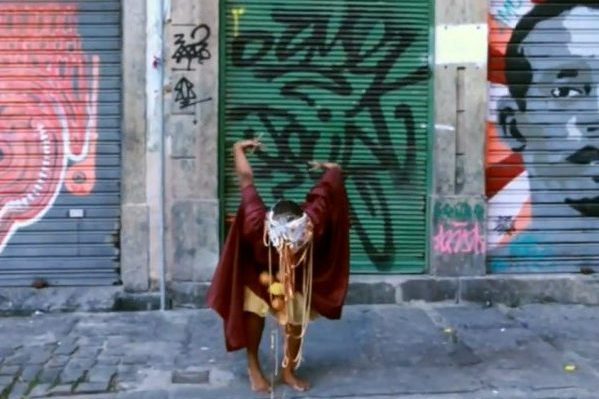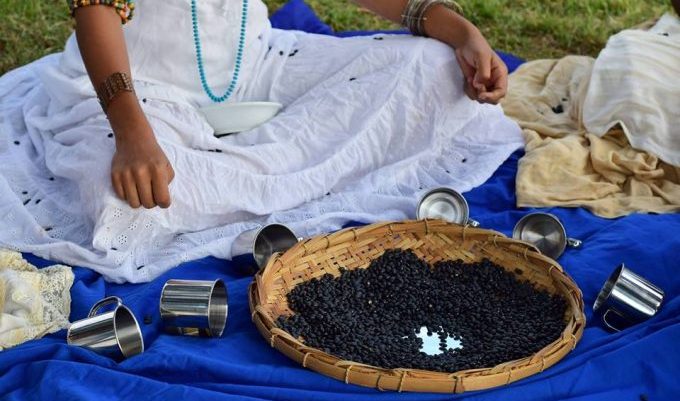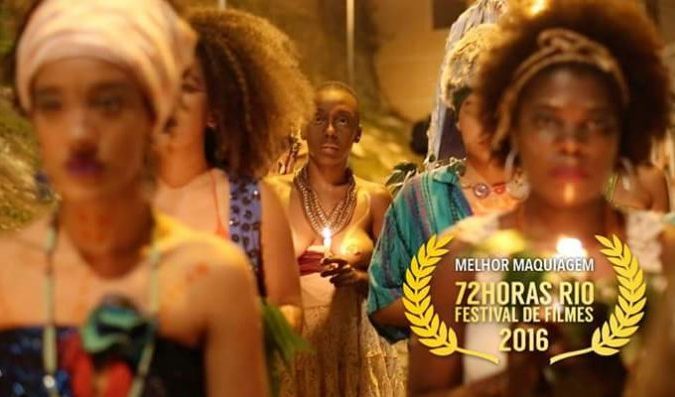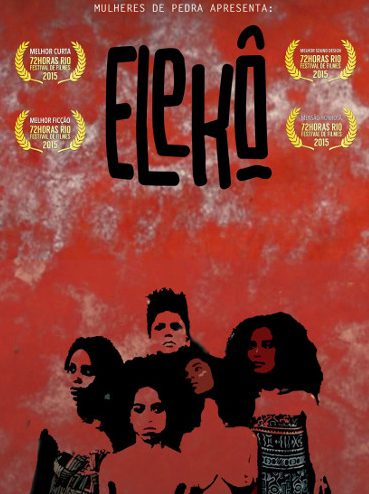
Coletivo Mulheres de Pedra [Women of Stone]. Elekô, 2015. Film still
Opening a Window: Films at Macquinho
JV Santos
It was cinema that opened a window in the only wall of the Macquinho that faces the Morro do Palácio favela. To think of care as a method in cinematic language is to contribute to creating access to other narratives, ones constructed by people who have historically always been things, almost objects of a scene in the hands of the white men with the same surnames that presided over Brazilian cinema. The evening featured seven films, all directed by women, all black.
Films
Listed in the order they were shown:
Favela que me viu crescer [Favela that saw me grow] (Brazil, 2014/2015, 15 minutes)
Documentary that portrays the life of Tia [Aunt] Dorinha, Vó [Grandfather] Chiquinha, Tião [Great Uncle] do Azul and Mais Preto [More Black]. From their stories and everyday lives, the film intertwines their narratives and relationships of affection built over time in Jacarezinho, a place they have seen grow and in which they have grown together.
Director: Paula Morena / Producer: Cafuné na Laje
English subtitles available
***
Coletivo Mulheres de Pedra (Women of Stone Collective)
Mulheres de Pedra is a group of black women from Rio de Janeiro who carry out projects with the purpose of valuing the protagonism of black women. The collective comprises actresses, musicians, cultural producers, and communication specialists, among others. That evening three films directed by the collective were shown.
Quijaua (Brazil, 2016, 6 minutes 16 seconds)
In the Angola nation, quijaua signifies a ritual bath of macerated herbs. (See Nei Lopes. Brazilian Banto Dictionary). Quijaua is a film about healing and feminine empowerment, made collectively. The herbal comes to renew the energies of our existence. Renewal is part of a cyclical process that accompanies us from the womb of our mothers and the water always goes through everything taking purity to soul.
Directors: Coletivo Mulheres de Pedra and Coletiva Escrita na Feminina (Collective Writing in the Feminine)
Trailer: www.facebook.com/quijauaofilme/videos/1209984932367378/
Elekô (Brazil, 2015, 6 minutes 28 seconds)
A thread of red poetry drives the audiovisual experience of making and asserting oneself in the madness of the conditions of being black and a woman. Looking at history from the harbor, recognize and affirm the powers and the beauty. Out of suffering comes a horizon of freedom, support and collaboration. Find in the presence of other women the strength of the feminine and the sacred sense of being, until you can celebrate life, in female communion and society.
Directors: Coletivo Mulheres de Pedra
Fé Menina [Faith Girl] (Series, Brazil, 2016)
Swamp, earth, water, mud, life, creation. Our ancestry vibrates on the face of the bay, the light of the moon and the sun, awakens female potency, hailing the belly of life. Connected with the sacred elements – fire, earth, air – the origin of the water rises, echoes the encounter marked and experienced by women. The Series Fé… menina is lived experience that connects peripheries, collectives, uteruses, aesthetics, memories, inspirations. A female audiovisual ritual that celebrates ancestry and awakens black powers.
Directors: Coletivo Mulheres de Pedra and Perifera Segue Sangrando – SP [The Periphery Continues Bleeding São Paulo]
Episode 1 (Brazil, 2016, 5 minutes 40 seconds)
Illuminated by the moon, the goddesses enter the poetic belly of the mangrove. Under the waning light the deification is revealed in gestures, movements, offerings that move the crossing marked by faith, spell and wisdom.
Directors: Coletivo Mulheres de Pedra and Periferia Segue Sangrando – SP
***
Da minha pele [From/Of my skin] (Brazil, 2016, 2 minutes 25 seconds)
Video poetry in honor of Diego Vieira Machado, a student of literature at the Federal University of Rio de Janeiro who was murdered on campus in June of 2016.
Directors: Rosa Miranda, Carol Rocha, Mi La and Allan de Souza
Trailer:
***
Travessia [Crossing] (Brazil, 2017, 5 minutes)
Travessia searches for the photographic memory of black families via a poetic language. The film adopts a critical stand in the face of the stigmatization and the near absence of portrayals of black people.
Direction: Safira Moreira
***
Tia Ciata [Aunt Ciata] (Brazil, 2017, 26 minutes)
Tia Ciata is a short documentary that approaches black female protagonism from the perspective of Hilaria Batista de Almeida (a.k.a Tia Ciata) a woman of great importance for Brazilian history and culture. Directed by the filmmakers Mariana Campos and Raquel Beatriz, the film brings together testimonies of black women who are references in the fight against racism and the visibility of black female protagonism in diverse fields. They are: the writer Conceição Evaristo, the philosopher and writer Helena Theodoro, the historian Giovana Xavier, Brazilian black film researcher Janaina Oliveira, the actress and anthropologist Angela Peres, the singers Marina Íris and Nina Rosa, Tia Ciata’s great-granddaughter, Gracy Mary Moreira and Iyalorixá Mother Beata de Iyemonja, who died in 2017 leaving a legacy of struggle for equal rights for black people and will always be a reference of ancestral force and resistance, inspiring generations. The film also features artistic performances by the Coletivo Mulheres de Pedra.
Directors: Mariana Campos and Raquel Beatriz.
Trailer:
***
Film Credits
Favela que me viu crescer
Proposal: Leo Lima
Research: JV Santos and Leo Lima
Director: Paula Morena
Assistants: Wagner Novais and Mariluci Nascimento
Producer: Aline Santos
Executive Producer: Ana Paula Santos
Assistant: Mariluci Nascimento
Local Producers: Vitor Luiz and Tia Beta
Interviewer: Leo Lima
Photography: Gê Vasconcelos and Ciro Mello
Camera: Renan Silva and Micael Hocherman
Photography Assistants: Eduardo Santos and JV Santos
Sound: Caíque Mello
Logger: JV Santos
Editing: Lu Dayrell
Driver: Marquinhos
Refreshments: Tia Beta e Pensão Morena Flor
Cast:
Vó Chiquinha – Francisca Mandú da Silva
Tia Dorinha – Maria das Dores de Lima
Mais preto – José Inácio Teixeira
Tião – Sebastião Gonçalves dos Santos
Music:
“Homenagem à Velha-Guarda do Jacarezinho”
Gilson Bernini
“O Fabuloso Mundo do Circo”
“Homenagem à Velha Guarda do Jacarezinho”
“Pirilampos, uma Lenda Curumin”
Unidos do Jacarezinho
Production T-Shirts: Leon Diniz
Acknowledgements:
Moto Taxi do Stuba; BAR DO JOAO; BAR DO JOAO GUARANI; FEIRANTES DA LINHA DO TREM
GRES UNIDOS DO JACAREZINHO; MARCELO PATROCINIO; AZUL F.C; EDINHO; DORA; JOSÉ HENRIQUE EX PRESIDENTE DA UNIDOS …
Jonas Rosa
SACOLÃO DA PRAINHA
Associação dos Moradores do Jacarezinho
Dorinha and família
Tiao and família
Chiquinha and família
Mais Preto and família
Coletivo Naviu
Norte Comum
Três filmes
Professor Gustavo Moraes
Adriana Barradas
Letícia Santanna
Leon Diniz
Bar do Oliveira
Campo da GE
Julia Rossi
Max Garcia
Julio Moda
Quijaua, Elekô, Fé Menina (Série) Episódio 1
Directors/producers: Coletivo Mulheres de Pedra
Da minha pele
Directors: Rosa Miranda, Carol Rocha, Mi La and Allan de Souza
Editing: Rosa Miranda
Music: ‘’Saudade’’ Naná Vasconcelos and ‘’A carne’’ Elza Soares
Poem: Rosa Miranda
Voice: Rosa Miranda
Cast: Ézio Rosa, Jo Gada, Natã Zimba, Niázia Nascimento, Rosa Miranda
Photography: Juliana Alves and JV Santos
Script: Rosa Miranda
Art Direction: Carol Rocha e Lorena Gomes
Sound editing:: Allan Souza e Rosa Miranda
Producers: Kbça D’ Nega e Camila Neves
Travessia
Director: Safira Moreira
Script / Editing / Producer / Sound: Safira Moreira
Production Assistant: Caíque Mello and Tuanny Medeiros
Photography and Camera: Caíque Mello
Tia Ciata
Interviewees: Angela Peres, Conceição Evaristo, Giovana Xavier, Gracy Mary Moreira, Helena Theodoro, Janaina Oliveira, Mãe Beata de Iyemonjá, Marina Iris and Nina Rosa.
Directors and Script: Mariana Campos and Raquel Beatriz
Research: Mariana Campos, Raquel Beatriz, Ana Beatriz Silva and Carolina Merat
Executive Producer: Mariana Campos
Production Director: Ana Beatriz Silva
Director Assistant: Carolina Merat
Photography Directors: Karen Ferreira and Eric Paiva
Camera: Karen Ferreira, Marina S.Alves and Eric Paiva
Sound: Amanda Moraes, Raquel Lázaro and Vilson Almeida
Editing: Raquel Beatriz
Sound Editing and Mixing: Raquel Lázaro
Still Photography: Carolina Merat and Aline Venâncio
Cast: Aissa Seidi, Ana Beatriz Silva, Ana Magalhães, Andréa Motta, Beà, Claudia Coutinho, Daiane Ramos, Dandara Raimundo, Jorgete Barbosa Xavier, Livia de Souza Vidal, Luciana Lacaster, Lumena Aleluia, Maria Menezes, Marina Íris, Mohara Valle, Nubia Jimenez, Sabrina Chaves e Verônica Costa.
Original Sound Track: Ana Beatriz Silva, Ana Magalhães, Beà, Daiane Ramos, Dandara Raimundo, María Paz and Tina
Communication: Silvana Bahia
Digital Communication: CANZAR
Graphic Design: Dávila Pontes and Roberta Nunes – Reconto
Videographics: Estúdio Roncó
English subtitles: Aissa Seidi and Diogo Ribeiro Alves
***
João Vitor Santos
João Vitor is an researcher and producer in audio visual media. Graduating in Media Studies from Universidade Federal Fluminense. Works via the independent collective initiatives Cafuné na Laje and Norte Comum.








































